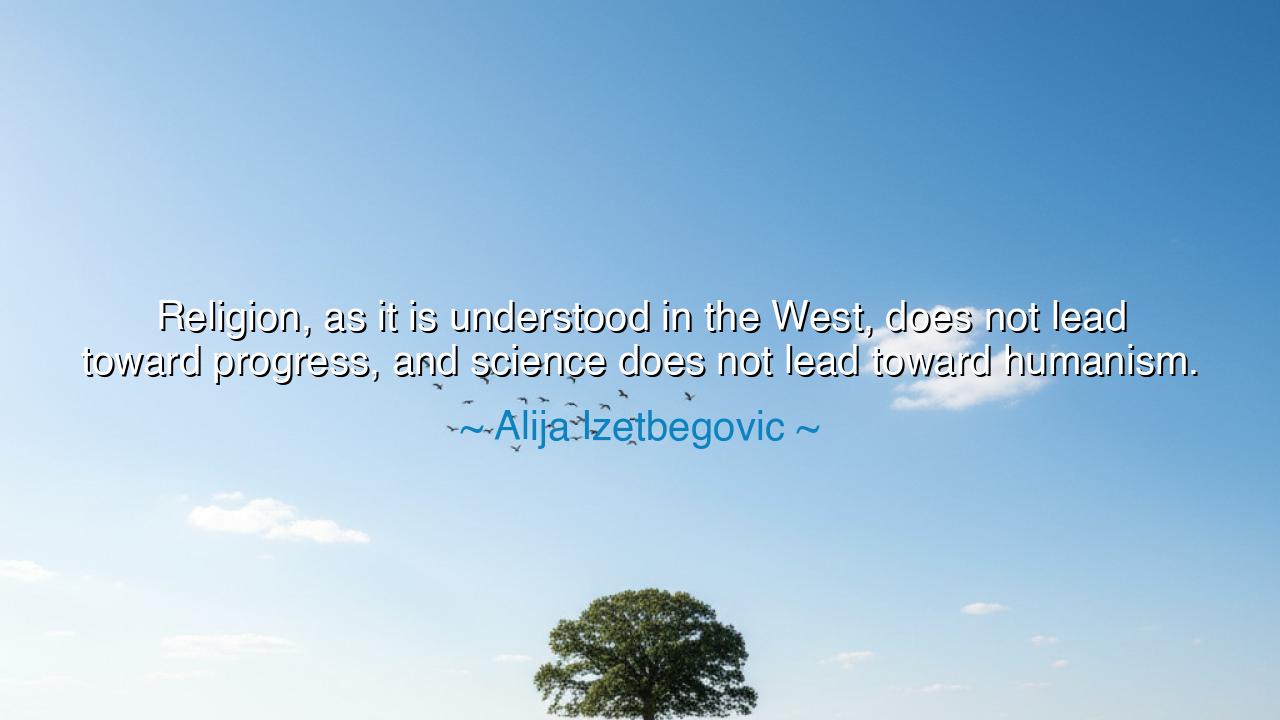
Religion, as it is understood in the West, does not lead toward
Religion, as it is understood in the West, does not lead toward progress, and science does not lead toward humanism.






"Religion, as it is understood in the West, does not lead toward progress, and science does not lead toward humanism." These words, spoken by Alija Izetbegovic, challenge the very foundations of modern thought. They call us to examine the trajectory of religion and science, two of the most influential forces in Western civilization, and question their true impact on the well-being of humanity. Izetbegovic’s words carry a powerful critique: that religion, in its current form, does not drive us toward progress, and that science, often heralded as the savior of mankind, does not necessarily lead us to greater humanism. This notion forces us to confront the complex relationship between belief, knowledge, and the true advancement of the human spirit.
Religion, as it has been practiced in the West, has often been intertwined with power, authority, and dogma. The great religious wars of the past, from the Crusades to the religious conflicts of the Reformation, show us that faith, when rigid and unyielding, can divide rather than unite, stifle rather than liberate. The Catholic Church, once the supreme authority in the West, wielded its power with such force that it not only shaped the spiritual lives of individuals but also controlled their intellectual and moral worlds. The Inquisition, the burning of heretics, and the suppression of scientific thought all demonstrate how religion, in its institutionalized form, often obstructed the very progress it claimed to foster.
Izetbegovic’s critique draws attention to a religion that has often failed to evolve alongside the changing needs of society. Dogma, when held too tightly, becomes a prison for the mind and a barrier to the growth of knowledge and understanding. It is not that religion is inherently negative; rather, it is that its rigid, unchanging interpretation in the West has often prevented humanity from embracing new ideas and visions for a better future. The ancient philosophers, such as Socrates and Plato, understood that true spirituality must be dynamic, evolving with the growth of human understanding. It is through the spiritual and intellectual growth of individuals that society moves forward, not through blind adherence to outdated beliefs.
In the same breath, Izetbegovic points to science, the modern pursuit of knowledge, and its failure to lead us toward humanism. Though science has brought about monumental advances in medicine, technology, and industry, it has not necessarily fostered a deeper humanity. The very tools of scientific progress—nuclear weapons, environmental degradation, and the pursuit of profit over people—show that science, in its pursuit of progress, often overlooks the moral and ethical questions that shape our humanity. Darwin's theory of evolution, while a monumental achievement in biology, was misused by some as a justification for the survival of the fittest, contributing to ideologies of racial superiority and oppression.
Take, for instance, the horrors of World War II, where scientific advancements in weaponry and technology were used to devastating effect, without regard for the suffering they caused. The rise of eugenics, an ideology rooted in misapplied scientific principles, sought to "improve" humanity by eliminating those deemed "undesirable." It is a painful reminder that science, without a guiding moral compass, can lead to destruction rather than progress. Izetbegovic’s words challenge us to consider the darker side of scientific progress—how it can be used for domination, manipulation, and the oppression of the weak.
The lesson we must take from Izetbegovic’s critique is not to discard either religion or science, but to seek a balance between the two that honors both our spiritual and intellectual growth. We must acknowledge that religion, when it fosters compassion, humility, and openness, can be a force for good, leading us toward progress. Likewise, science, when coupled with a strong sense of humanism, can lead to true advancement. We must strive to create a world where the pursuit of knowledge does not overshadow our humanity, where moral considerations guide our technological innovations, and where spirituality evolves alongside our understanding of the world.
To move forward, we must cultivate a spirituality that embraces change and growth, one that encourages inquiry and openness rather than dogma and division. We must also ensure that science is guided by the principles of humanism, seeking to alleviate suffering and promote the well-being of all people. In doing so, we can create a society where progress and humanity go hand in hand—where knowledge and compassion are not at odds, but work together to create a better world for future generations.






AAdministratorAdministrator
Welcome, honored guests. Please leave a comment, we will respond soon